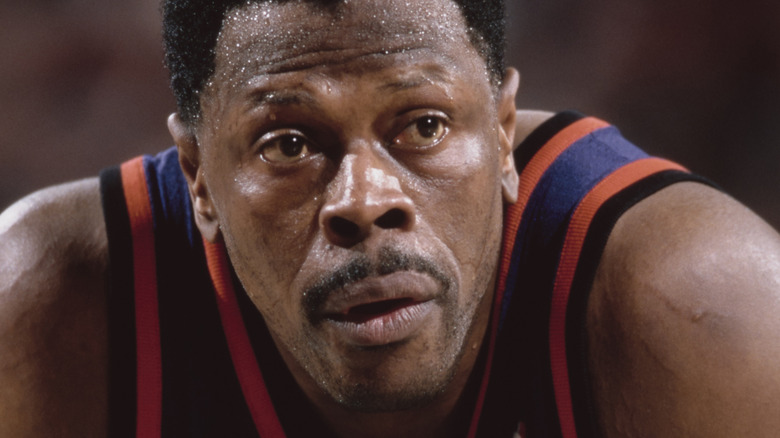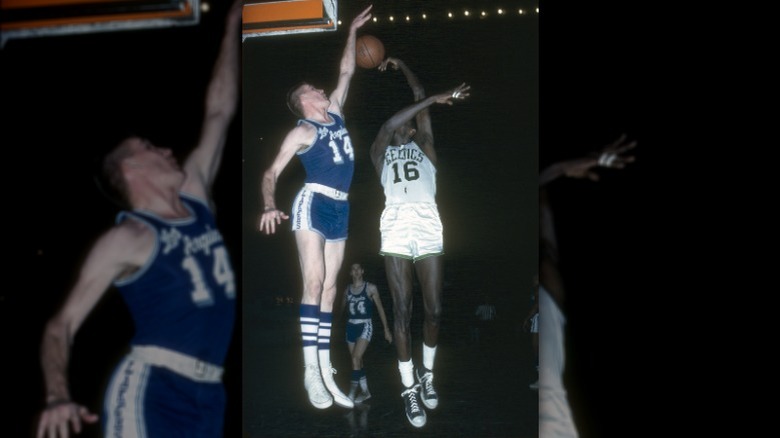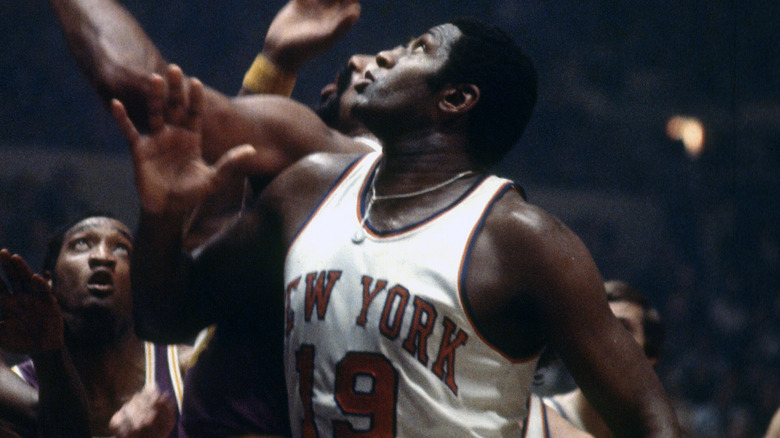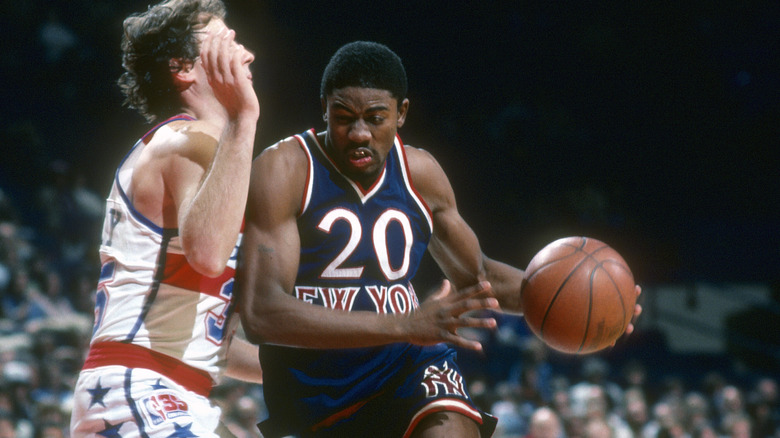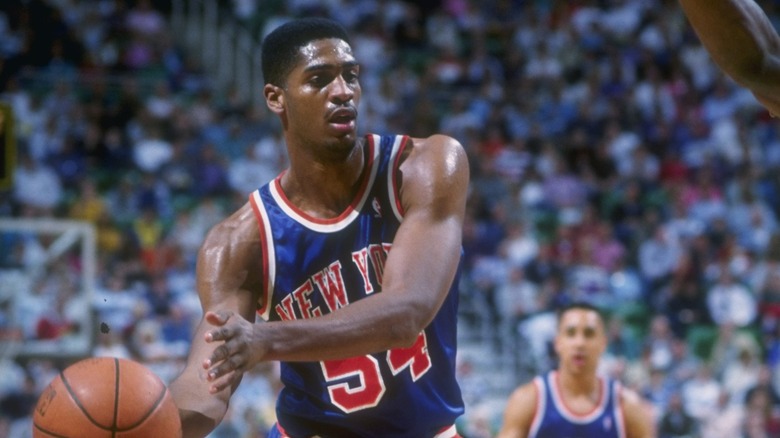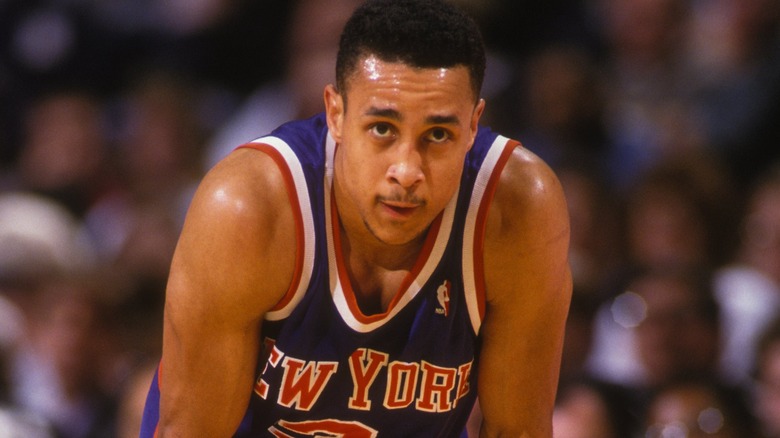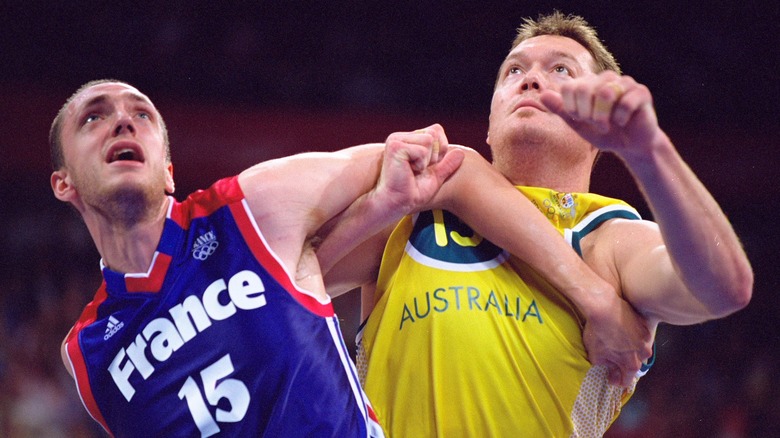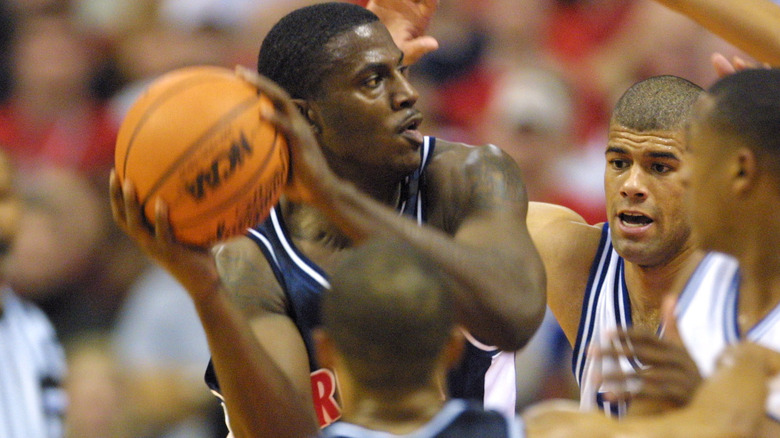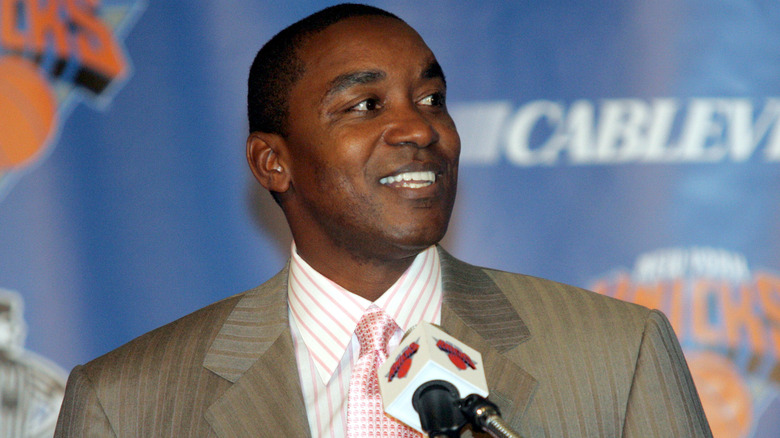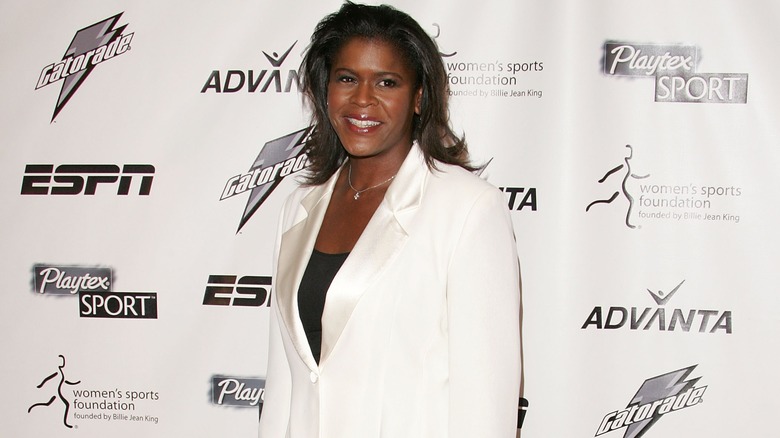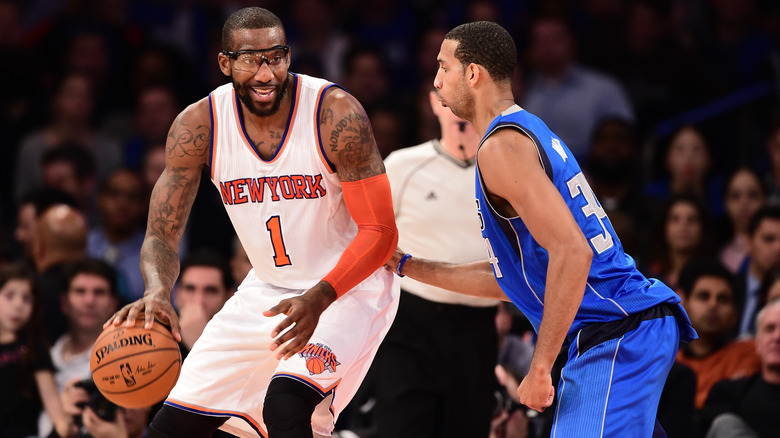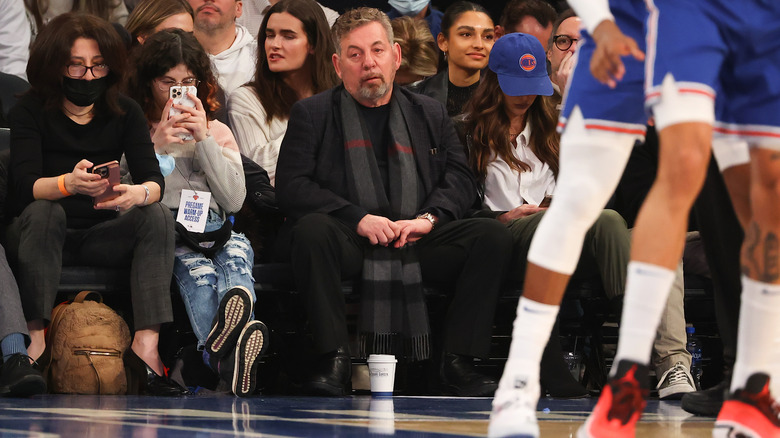The Tragic History Of The New York Knicks
The New York Knicks have practically seen it all. Of course, those two championships in the 1970s will always stand out among the franchise's biggest accomplishments, and players such as Willis Reed, Patrick Ewing, and even Carmelo Anthony are fondly remembered for their contributions to the team's success. But if you come to think of it, those two titles are the only ones the Knicks have won since 1946. Compare that to the Los Angeles Lakers or Boston Celtics, who have also been around since the 1940s but have won far more championships.
But it's not just a lack of trophies in the case that make the Knicks' team history seem so tragic. The last two decades have seen precious few playoff appearances, as well as various front-office controversies that oftentimes took the attention away from the actual basketball. Then you've got the wasted talents who could've been legendary if not for personal demons or nagging injuries. Saddening as the stories of these people and events may be, they are all part of the Knicks' ongoing story as one of the NBA's oldest teams.
A series of bad drafts and subpar seasons in the early '60s
During the NBA's earliest years, the New York Knicks weren't a particularly bad team. They were a decent, middle-of-the-road team and even a sometime-title contender. That changed in the early 1960s thanks to some questionable drafting decisions. Granted, this was before the era of advanced scouting, mock drafts, and all those other things that make the lead-up to the NBA Draft so intriguing, but the Knicks couldn't seem to get it right on draft day.
Just how badly did the Knicks perform in the draft? Well, in 1960, they selected California big man Darrall Imhoff (pictured in 1965 with the LA Lakers) right after would-be legends Oscar Robertson and Jerry West went 1-2 respectively. He had a decent 12-season run as a journeyman center but didn't live up to the expectations of a third-overall pick. In 1961, they drafted St. Bonaventure star Tom Stith No. 2 overall, but he averaged only 3.1 points in his only NBA campaign. Then 1962 saw the Knicks select Cincinnati's Paul Hogue at No. 2, and he, too, had a disappointing NBA career, as did 1963's first-overall pick, Duke standout Art Heyman.
The Knicks fell short of winning 30 games for five straight seasons from 1959-1964; things seemed to be looking up a bit when they went 31-49 in the 1964-65 season. Ahead of that campaign, they used their second straight No. 1 overall pick on UTEP's Jim Barnes, and while he was also a flop, New York's second-rounder, Willis Reed, went on to be named that season's Rookie of the Year.
A quick decline after their last title
The New York Knicks may have had it rough in the early '60s, but by the second half of the decade, they were a gradually improving franchise. Powered by players such as Willis Reed, Dave DeBusschere, Bill Bradley, and Walt Frazier and coached by Red Holzman, the Knicks won their first NBA championship in 1970 and another one in 1973. They also had a strong 1973-74 campaign in which they won 49 regular-season games and made it to the Eastern Conference Finals. But it didn't take long for the early '70s Knicks juggernaut to fall apart.
As documented by wire reporter Bert Rosenthal in the "Basketball News 1974-75 Pro Yearbook" (via From Way Downtown), age and injuries decimated the Knicks' lineup in the aftermath of their 1972-73 title. DeBusschere retired in 1974, Reed's status was doubtful due to nagging knee injuries (he sat out all of 1974-75 and retired soon after), and Reed's backup, Jerry Lucas, had announced his retirement the year prior. With New York unable to replace their departed stars, the Knicks won just 40 games in 1974-75 and made the playoffs only twice between 1974 and 1980.
Perhaps nobody summed it up better than backup forward Phil Jackson, who shared his thoughts with Rosenthal after they lost to the Boston Celtics in the 1974 Eastern Conference Finals. "There was something missing. We were struggling; we didn't go out as a unit," he said. "That bothers me as much as losing."
Micheal Ray Richardson was banned from the NBA due to drugs
By the dawn of the 1980s, the New York Knicks' rebuilding efforts seemed to be paying off. The 1979-80 lineup, for one, went 50-32 behind a young nucleus that featured point guard Micheal Ray Richardson. But despite his unquestioned talent, Richardson's NBA career was over at the age of 30. This is a man who was once described by no less than Boston Celtics icon Larry Bird as the best guard in the league, right behind one Earvin "Magic" Johnson. So how come his career ended so soon?
As reported by the Los Angeles Times, the former University of Montana point guard first tried cocaine in 1978. While he made three All-Star appearances in eight NBA seasons, he spent multiple stints in rehab, was known for reckless overspending, and wore out his welcome with three teams — the Knicks, the Golden State Warriors, and finally, the New Jersey Nets. In February 1986, Richardson received an indefinite ban from the NBA after incurring a third violation of the league's anti-drug policy.
Fortunately, Richardson was able to turn his life around after the ban, as he continued his playing career in Europe and in the minor-league Continental Basketball Association and enjoyed success later on as a coach.
If you or anyone you know needs help with addiction issues, help is available. Visit the Substance Abuse and Mental Health Services Administration website or contact SAMHSA's National Helpline at 1-800-662-HELP (4357).
The Knicks came so close, yet so far to preventing the Bulls' first three-peat
As the Knicks' early '90s boom period coincided with the ascendance of the Michael Jordan-led Chicago Bulls as the NBA's newest dynasty, it wasn't going to be easy to add a third championship to their trophy case, even with Patrick Ewing as their franchise center and Pat Riley as head coach. Still, New York had a fighting chance in the 1993 Eastern Conference Finals as they carried a 27-game home winning streak into Game 5 of their series against the Bulls.
The Knicks had a chance to edge the Bulls in the dying seconds of that game, but Charles Smith (pictured above) missed four straight tries at an easy three-footer, getting blocked thrice and nearly losing the ball to Jordan during one of his attempts. The Bulls won Game 5, 97-94, to take a 3-2 series lead, and the Knicks missed out on a chance to gain a huge boost of momentum and potentially prevent Chicago from bagging their first of two three-peats.
Speaking to the New York Post in 2020, Knicks legend Charles Oakley didn't blame Smith for the heartbreaking loss as much as he blamed Ewing. "Patrick, at the end of the game, he'd get double-teamed,” he said. "He'd shoot fadeaways on double-teams and that hurt us as a team." Oakley also accused Riley of failing to adjust his strategy in the second half and basically getting out-coached by the Bulls' Phil Jackson — yes, that same role-playing backup forward from the Knicks' 1970 and 1973 championship teams.
John Starks goes cold in Game 7 of the 1994 Finals
Following Michael Jordan's surprise first retirement, the New York Knicks appeared poised to win it all in 1993-94. They were tied for the best record in the Eastern Conference, they had a powerhouse lineup led by the likes of Patrick Ewing, Charles Oakley, and John Starks, and they had the NBA's best defense, holding opponents down to just 91.5 points per game. They made it all the way to the Finals against Hakeem Olajuwon and the Houston Rockets, but would come so near, but yet so far away from winning championship no. 3. Much of the blame for this has been placed on Starks, who was normally a prolific three-point shooter and dependable performer in the clutch.
Sadly for the Knicks, none of that was present in Game 7 of their championship series against the Rockets. All game long, Starks struggled with his shot, yet Knicks coach Pat Riley stuck by him. When it was all done, he finished with 2-for-18 shooting from the field and missed all 11 of his three-point attempts. Final score: Rockets 90, Knicks 84.
Could the Knicks have ended their 21-year championship drought if Starks played his usual game? It's a plausible scenario. But it certainly helped the Rockets' cause that their top three guards — Vernon Maxwell, Kenny Smith, and Sam Cassell — brought their A-game and offered ample support to the dominant Olajuwon, who outplayed Ewing in the middle in that crucial contest.
Frederic Weis lived a troubled life after failing to crack the Knicks' lineup
Frederic Weis was infamously posterized by Team USA's Vince Carter in the 2000 Olympics. Some may argue that was the reason the Frenchman never played in the NBA after the New York Knicks drafted him No. 15 overall in 1999, right ahead of local hero Ron Artest (later Metta World Peace). But it goes far beyond that, as detailed by The New York Times in a 2015 feature on the 7-foot-2 center.
In the article, Frederic's wife, Celia, recalled how her husband was allegedly informed by Knicks officials, "You're not really the guy we were supposed to draft." Frederic also claimed that Knicks' coach Jeff Van Gundy was cold toward him when he reported for summer league play. After failing to impress, Frederic opted to remain in France, but as he insisted, he never heard from the Knicks again despite his desire to play in the U.S. Then came his son Enzo's autism diagnosis soon after his birth in 2002, and a separation from his wife in 2004; these issues drove Frederic to drink in excess as his on-court play suffered.
Early in 2008, Frederic Weis attempted suicide, but the act motivated him to quit drinking, and he eventually reconciled with Celia. However, The New York Times noted that he was still dealing with depression and mood swings at the time of the feature.
If you or anyone you know is having suicidal thoughts, please call the National Suicide Prevention Lifeline by dialing 988 or by calling 1-800-273-TALK (8255).
The murder of former Knicks draft pick Michael Wright
A 6-foot-8-inch power forward who played for the University of Arizona Wildcats, Michael Wright never played in the NBA after he was drafted 39th overall by the New York Knicks in 2001. He went on to have a lengthy professional career in Europe but was only 35 years old and just months removed from a brief stint with a French team when he was found dead in his Lexus SUV in Brooklyn on November 10, 2015, according to the New York Daily News. Police sources who spoke to the outlet revealed that they were treating Wright's death as a possible homicide.
Almost one year later, two men — Mark Holdbrooks and David Victor — were charged with Wright's murder. As reported by NBC New York, prosecutors said the two suspects allegedly drugged the former Knicks draft pick at his home, then killed him before dumping his body into his vehicle. The outlet also noted that Wright and Holdbrooks were roommates who shared a home with their two daughters.
"It's kind of disturbing, now that they have to learn Mark, who was their guardian, is now their father's murderer," Wright's trainer, Dave Paladino, told NBC New York. "It's very disturbing, very tragic."
Isiah Thomas: Great player, not-so-great executive
One of the greatest Detroit Pistons players of all time, Isiah Thomas had few peers at the point guard position in the 1980s. His play sparked the Pistons' "Bad Boys" lineup to two straight NBA championships in 1989 and 1990, and earned him a Basketball Hall of Fame nod in 2000. But as New York Knicks president of basketball operations from 2003 to 2008, he was subject to all sorts of criticism. In that five-year span (including two where he also served as head coach), the Knicks failed to post a winning record and won just 23 games in two of those campaigns.
Thomas made a number of much-maligned roster moves, many of which contributed to New York's reputation at the time as an overpaid, underperforming team that was especially bad on defense and disorganized on and off the court, as documented by New York Magazine. For example, the Knicks traded for a past-his-prime Steve Francis in February 2006 only for the former Houston Rockets All-Star to post average-at-best numbers. Just months prior, they acquired Eddy Curry in a deal that sent several draft picks to the Chicago Bulls, including two that became future stars LaMarcus Aldridge and Joakim Noah. Aside from his defensive woes, Curry also struggled with weight problems during his time in the Big Apple.
It didn't help that Thomas purportedly developed a reputation as a smug, arrogant individual behind the scenes. "There's a feeling of superiority about him," a former Knicks associate told NY Mag. "You wish once in a while that his tie was not up so tight."
Former Knicks exec Anucha Browne Sanders sued Isiah Thomas for sexual harassment
In addition to the many questionable trades and signings, there was another more unfortunate hallmark of the Isiah Thomas era. The New York Knicks locker room culture came under intense scrutiny during this time, and Thomas was notably accused of sexual harassment by former Knicks vice president for marketing and business operations Anucha Browne Sanders. According to The New York Times, Sanders alleged that Thomas started making sexual advances toward her in 2004, and claimed that she was fired for issuing a formal harassment complaint. In 2007, she was awarded $11.6 million in damages from Thomas and the team's ownership after the Federal District Court in Manhattan ruled in her favor.
It wasn't just Thomas whose actions were spotlighted during the trial. New York Magazine wrote that star point guard Stephon Marbury admitted on the stand to calling Sanders a "b****," while his cousin, Hassan Gonsalves, purportedly harassed a number of female Knicks co-workers. This was the last straw for Sanders, who filed the complaint that allegedly led to her termination. "It was so sordid," she told NY Mag. "I said [to Madison Square Garden Sports head Steve Mills], 'You have to deal with this.' And I was fired within the month."
If you or anyone you know has been a victim of sexual assault, help is available. Visit the Rape, Abuse & Incest National Network website or contact RAINN's National Helpline at 1-800-656-HOPE (4673).
Amar'e Stoudemire's rapid decline in New York
Of all the preps-to-pros phenoms who joined the NBA in the decade or so after Kevin Garnett and Kobe Bryant debuted straight out of high school, Amar'e Stoudemire was one of the most talented and productive. The 6-foot-10-inch forward-center wasted little time making an impact after the Phoenix Suns drafted him ninth overall in 2002, and was a five-time All-Star at the time the New York Knicks acquired him ahead of the 2010-11 season. He didn't disappoint in his first season in New York, averaging 25.3 points, 8.2 rebounds, and 2.6 assists as the Knicks improved from 29-53 the season prior to 42-40. However, that was the last season where Stoudemire played at a truly elite level.
Stoudemire was no stranger to knee injuries upon his arrival in New York, but he was able to come back strong during his time in Phoenix. However, the procedures on both of his knees that limited him to just 29 games in 2011-12 were a different story. Although he played 65 games the following campaign, he mostly came off the bench and barely averaged double figures in points, and he was ultimately waived by the Knicks in February 2015 after another half-season of underwhelming play. Long story short — he was already washed up in his early 30s, and his career, stellar as it was, could have been even better had he stayed healthy in his prime years.
The James Dolan era in general
Officially, the New York Knicks are owned by the Madison Square Garden Sports Company, but James Dolan has been the face of Knicks ownership since the start of the century. At the time of writing, the Knicks have made the playoffs only six times in the 22 full seasons since Dolan took over. But that's just scratching the surface of why Dolan is considered one of the NBA's worst team owners.
Not only did he hire Isiah Thomas as the Knicks' president and keep him around for five years; he also received criticism in 2015 for bringing him back to the MSG fold as president of the WNBA's New York Liberty despite the lingering fallout from the Anucha Browne Sanders case. In 2020, he came under fire when the Knicks remained silent in the immediate aftermath of George Floyd's murder; ESPN's Pablo Torre took to Twitter to share a copy of an email Dolan sent to MSG employees, which, in part, stated that "we are not any more qualified than anyone else to offer our opinion on social matters." He also angered longtime Knicks superfan Spike Lee following an altercation he had with MSG security, forcing the legendary director to boycott the rest of the 2019-20 season.
Combine the Knicks' recent struggles to field a competitive team with all those public relations disasters and you've got a good idea of why Dolan is so unpopular among NBA fans and pundits.
